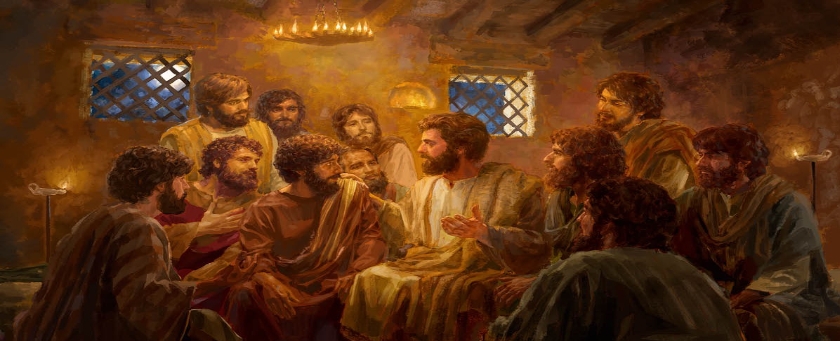Jesus Commands Us to Love One Another
Fifth Sunday of Easter, Year C

Readings:
Acts 14:21-27; Ps. 145; Rev. 21:1-5a; Jn. 13:31-33a, 34-35
(Audio recorded live, 15 May 2022)
As we continue to read from the Acts of the Apostles, Paul and Barnabas begin their second mission to the Gentiles. St. Luke tells us that it was in Antioch where the followers of Jesus were first known as Christians. So, Antioch played a significant role in the development of the Early Christian Church. Just a few weeks ago, we heard of how Paul and Barnabas were persecuted and forced out of Antioch by the Jews. The persecution even followed Paul to Derbe, where he was stoned, dragged out of the city, and left for dead. But, we hear today how Paul and Barnabas return to Antioch, where they encourage the communities they founded on their first mission. The name Barnabas actually means “Son of Encouragement.” Just consider how encouraging it must have been for the Christian community to hear about their beloved Paul being stoned and yet seeing him once again. Luke tells us, “They strengthened the spirits of the disciples and exhorted them to persevere in the faith, saying, ‘It is necessary for us to undergo many hardships to enter the kingdom of God.’” Such words coming from a man who nearly died for the faith had to strengthen the spirits of a persecuted Church. But, Paul and Barnabas knew that their work was not finished. They departed for Pisidia, Pamphylia, Perga, and Attalia to continue the mission of preaching the Gospel of Jesus Christ. In other words, they never backed down, they never gave up, the kept the faith, and persevered no matter what obstacles came their way. And we are called to do the same.
Paul says it is necessary for us to endure many hardships to enter the Kingdom of God. And we have yet another glimpse of that kingdom in the Book of Revelation. John sees a new heaven and a new earth and the holy city Jerusalem coming down out of heaven from God. Jerusalem was the the spiritual center of the people, but after the Temple was destroyed in 70AD, there was no more worship, no more sacrifice. But, what John sees is the restoration of that worship by God. Until Christianity took root, the people were scattered as pharisaic Judaism took over and Christians began to follow Jesus. Why was there tension in Antioch? There were two different groups born out of the same belief system, one which opposed Jesus and the other which embraced him. But, God is over all. John tells us, “Behold, God’s dwelling is with mankind. He will dwell with them and they will be his people.” How is God’s dwelling made manifest in the Church? Through the sacraments, through our worship, through our devotion, through our prayers, but primarily through the sacraments, and most especially the Eucharist. “The One who sat on the throne said, ‘Behold, I make all things new.’” Indeed, the Church is new, it is forever new, because it is the symbol of what Jesus is doing in the world.
But, we know that the world is broken. We saw that in Judas, who betrayed Jesus. Jesus knew that Judas was going to have him handed over. That is why he says, “Now is the Son of Man glorified, and God is glorified in him.” This Son of Man, the one sitting on the throne in heaven, who makes all things new, is glorified through suffering. Indeed, it is necessary to endure many hardships to enter the Kingdom of God. We, too, will experience many hardships in this life because they are necessary. It was necessary for Jesus to suffer before he could enter into glory, why would it be any different for us? Our goal, then, should be to suffer well, to deal with hardships well.
How do we handle our struggles? Do we handle them with grace, as Paul and Barnabas did? Do we persevere in our faith, or do we give up on God? God has not given up on us. The fact that we are still breathing is proof that God has not given up on us. And God gives us the grace we need to accomplish his will.
And what is God’s will? Jesus made that very clear in today’s gospel, saying, “As I have loved you, so you also should love one another.” Jesus loves us unconditionally. There is nothing we can do to earn his love, he gives it freely. And while we may sometimes struggle in this life, especially with our relationships with others, we are called to love one another unconditionally, as Jesus does. He loved us so much, he gave his own life for the life of the world. And that life, that Divine Life, is what we celebrate at every Mass, with every Eucharist, in perfect communion with the Father, and the Son, and the Holy Ghost. So, may that communion we receive be a sign of the love of God outpoured, so that we may take that love out into the world, and share it with one another.





Share this post
Twitter
Facebook
Pinterest
Email